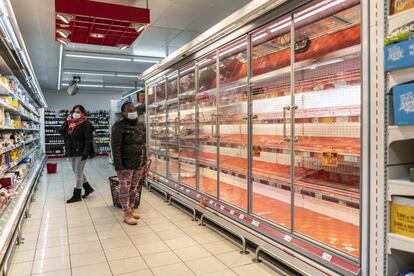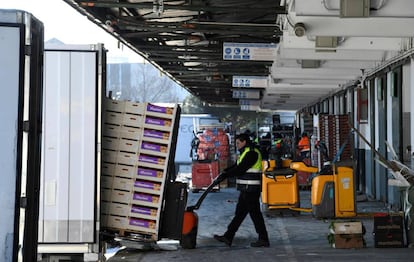Supermarkets restock empty shelves as snow cleared from Madrid, Castilla-La Mancha
Problems are still being noted in the Spanish capital, where stores on smaller streets remain inaccessible to delivery trucks


Ongoing work to clear logistics centers, roads and streets of the snow that fell this weekend during the blizzard caused by Storm Filomena is helping supermarkets in the affected areas gradually get back to normal. Many outlets were left without products on Monday, in particular fresh produce, given the impossibility of delivery trucks reaching them.
But some resupply problems persist, in particular in the Spanish capital, where vehicles cannot access grocery stores that are located in smaller streets that are still covered in snow. These points of sale are being restocked where possible using smaller vehicles or from nearby areas that are clear of snow. On the main streets, which can be accessed without issue, as well as in the rest of the Madrid region and Castilla-La Mancha, the majority of stores have been resupplied already.
Ignacio García Magarzo, the general secretary of Asedas, an association representing the Dia, Mercadona and AhorraMás supermarkets among others, said that the problem is at “the last mile” of the logistical process. Mercamadrid, Spain’s biggest wholesale market, as well as the logistical bases located on the outskirts of the city, are working at full speed or nearly. Thanks to the work of the Military Emergency Unit (UME), a major industrial park in the Madrid city of Getafe opened on Tuesday morning, allowing the distribution companies based there to reopen. This park was the last to return to normal operations. Mercamadrid has already received around a thousand delivery trucks, above the average of 800, carrying 14 million kilos of fresh produce, according to Madrid Deputy Mayor Begoña Villacís.

The transportation problem is due to the last part of the route, and is affecting the aforementioned supermarkets on narrow streets that are still blocked by snow and ice. “It’s going bit by bit, slowly,” explained García Magarzo. “Outside of the M-30 [ring road in the capital] and the rest of the Madrid region – with the exception of San Agustín de Guadalix and Colmenar Viejo – and in Castilla-La Mancha, the situation is very good.”
The wider streets in the capital city have been cleared. “But there are areas where full restocking is not possible. [...] There’s still a lot of work to do.”
Dia, which has around 600 stores in the Madrid region, was able to open all of its stores today, but not all have been restocked. The company says that its logistical centers are working at 100%, and they are running shuttle buses from public transportation points for staff members who need them. Their full fleet of trucks is operational but an indeterminate number of stores are lacking stock.
Meanwhile, Spain’s major department store chain, El Corte Inglés, has opened all of its stores, as well as its Supercor supermarkets, in the Madrid region and Guadalajara. They will, however, have a different timetable, closing at 7pm while the “extreme climate situation” lasts.
As was the case during last year’s coronavirus lockdown, the sector is calling on customers not to panic buy, and say that there is no problem with supply apart from the difficulties in restocking certain products in certain stores. “The supply chain is guaranteed,” said Magarzo during an interview on the Cadena SER radio network. “The products are available, it is just some streets that need to be supplied,” he added, calling for “calm.” He also called for “understanding” from customers, calling on them not to change their habits and not to stockpile.
English version by Simon Hunter.
Tu suscripción se está usando en otro dispositivo
¿Quieres añadir otro usuario a tu suscripción?
Si continúas leyendo en este dispositivo, no se podrá leer en el otro.
FlechaTu suscripción se está usando en otro dispositivo y solo puedes acceder a EL PAÍS desde un dispositivo a la vez.
Si quieres compartir tu cuenta, cambia tu suscripción a la modalidad Premium, así podrás añadir otro usuario. Cada uno accederá con su propia cuenta de email, lo que os permitirá personalizar vuestra experiencia en EL PAÍS.
¿Tienes una suscripción de empresa? Accede aquí para contratar más cuentas.
En el caso de no saber quién está usando tu cuenta, te recomendamos cambiar tu contraseña aquí.
Si decides continuar compartiendo tu cuenta, este mensaje se mostrará en tu dispositivo y en el de la otra persona que está usando tu cuenta de forma indefinida, afectando a tu experiencia de lectura. Puedes consultar aquí los términos y condiciones de la suscripción digital.








































